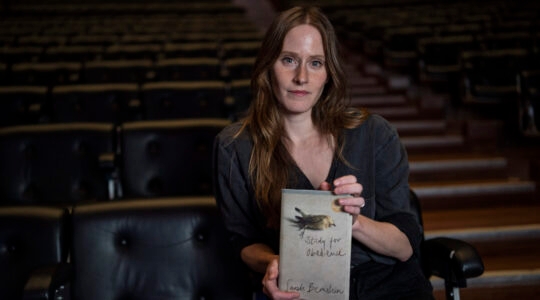BEIJING (JTA) – Two Israeli exchange students are missing in the aftermath of a devastating earthquake in China, but officials are hoping that it’s a lack of communication rather than injury or death that has prevented contact.
Israeli Foreign Minister Tzipi Livni joined other world leaders in expressing sympathy to China as the death toll continued to rise above 12,000 following Monday’s tragedy in the Sichuan province.
“Our hearts go out to the families of the victims and we pray for the speedy recovery of all the survivors,” Livni wrote in a letter to Chinese Foreign Minister Yang Jiechi.
There was still no communication from the two Israeli students who had traveled away from their study abroad program with Reidman College during the time of the earthquake, which registered 7.8 on the Richter scale.
Guy Kivetz, press officer for the Israeli embassy in Beijing, said Tuesday that the embassy had no information about the students’ whereabouts.
“We are in constant contact with authorities in Beijing and Sichuan,” Kivetz told JTA. “I’m afraid they don’t have the complete picture as well.”
“Our working assumption is that we lost touch with them because of communication problems and not otherwise,” he said.
Kivetz said the students were traveling at a distance from the epicenter of the earthquake, so it isn’t at the top of the rescue team’s agenda.
Reidman College, Israel’s largest school for Chinese and alternative medicine, offers an exchange program at Sichuan’s Chengdu University of Traditional Chinese Medicine.
Ten classmates of the missing students have been confirmed safe.
Israeli student Ronen Medzini was able to send a text message Monday to The Associated Press, despite the quake knocking down more than 2,300 cell phone towers.
“Traffic jams, no running water, power outs, everyone sitting in the streets, patients evacuated from hospitals sitting outside and waiting,” he wrote.
With a population of 10 million, Chengdu is the largest city in the area of the earthquake. But it is located 60 miles away from the earthquake’s epicenter, so it was spared severe damage and casualties.
Tremors from Monday’s earthquake were felt as far away as Vietnam. They set off a quake of 3.9 magnitude outside Beijing, 900 miles away.
It was the largest earthquake to hit China since 1976, when 240,000 people were killed in the city of Tangshan near Beijing.
With the death toll rising as rescue workers reach towns and villages in the countryside, the Chinese government’s account of the damage includes more than 25,000 people injured and as many as 3.5 million homes destroyed.
Xinhua, the Chinese press agency, reported that in just one city near the epicenter Mianyang, more than 18,645 people were buried in the rubble and 3,629 people were reported dead.
The Chinese government mobilized 50,000 soldiers, and Prime Minister Wen Jiabao flew to the area. Rescue teams were hampered by aftershocks with a magnitude of 4.0 and greater that hit western China for 24 hours after the earthquake.
Wang Zhenyao, the director of the disaster relief bureau of the Ministry of Civil Affairs, said Tuesday in Beijing that China is not yet prepared to accept outside relief and rescue workers because the transportation infrastructure cannot handle the additional traffic.
Wang did say the Chinese government would receive donations from international relief agencies and forward them in a timely manner to devastated areas.
Dini Freundlich, the co-director of Chabad-Lubavitch of Beijing, said she felt the earth shaking Monday. Although Chabad has no presence in western China, Freundlich said the 22 Chabad emissaries across the country are waiting to hear from anyone who might need help getting home or contacting their families.
The American Jewish Joint Distribution Committee, which conducts humanitarian relief efforts worldwide, is assessing the situation in China “and will determine whether or not we will open an emergency mailbox to help those in need,” said its executive director, Steve Schwager.

Help ensure Jewish news remains accessible to all. Your donation to the Jewish Telegraphic Agency powers the trusted journalism that has connected Jewish communities worldwide for more than 100 years. With your help, JTA can continue to deliver vital news and insights. Donate today.





